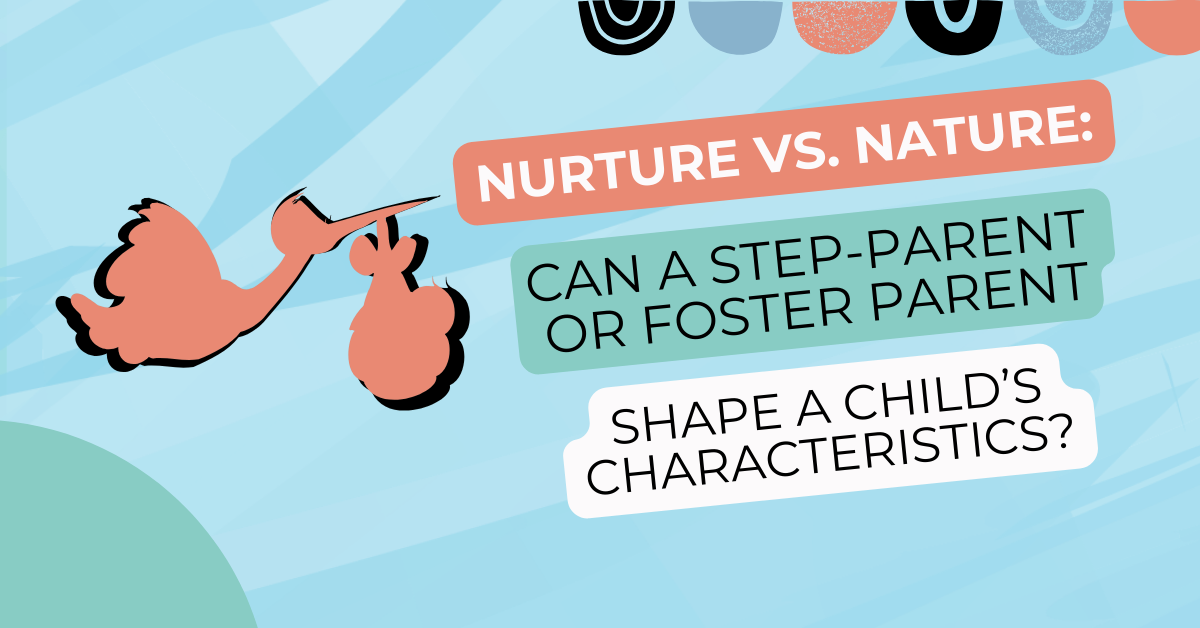Nurture vs. Nature

Can a Step-Parent or Foster Parent Shape a Child’s Characteristics?
Let’s get one thing straight—raising a child who isn’t biologically yours? That’s not just parenting. That’s legacy-building. It’s sculpting in sand, knowing the tide of genetics might sweep in at any moment. It’s planting seeds in borrowed soil, then tending them with the kind of care that makes anything grow.
But here’s the real question: Can a step-parent or foster parent actually shape who a child becomes? Their personality, their values, their path in life? Or are they simply brushing up against the edges of a genetic script that’s already been written?
Let’s unpack it—science, soul, and straight talk.
The Nature Argument: DNA’s Stubborn Blueprint
Ever heard the phrase, “the apple doesn’t fall far from the tree”? Behavioural genetics tends to agree. Studies show that traits like temperament, intelligence, and even impulsivity have strong genetic components. Research by Plomin et al. (2018) using identical twins raised apart highlights how these elements can persist regardless of environment.
So yes, a child may arrive with a genetic roadmap. But here's the thing: a map is useless without a guide.
The Nurture Argument: The Power of Presence
If nature hands out the blueprint, nurture handles the renovation. Attachment theory, developed by John Bowlby (1958), reminds us that a child’s sense of safety, trust, and emotional resilience is shaped through consistent, responsive caregiving. And yes, that includes step-parents and foster carers.
Research from Dozier et al. (2006) on attachment in foster children shows that a stable, caring environment can foster major shifts in emotional regulation and self-worth. Further studies by Pears & Fisher (2005) confirm that even children who've endured trauma can build resilience when placed in nurturing, structured environments.
Environment doesn’t just influence—it rewires.
The Step-Parent Effect: Earning Influence, Not Demanding It
Being a step-parent is like joining a film halfway through and being handed the director’s chair. The role is real, but the script is full of footnotes. Still, your impact? Unmistakable.
According to Baumrind (1991), children thrive under authoritative parenting—structured, warm, and firm. Step-parents who set boundaries with kindness tend to raise kids with stronger emotional intelligence, better academic results, and healthier relationships.
That said, it takes time. Trust doesn’t arrive on demand—it’s built, earned, and proved. Especially when a child’s internal monologue whispers, You’re not my real mum or dad. And that’s okay. The goal isn’t to replace anyone. It’s to be someone they can rely on.
Foster Parenting: Rebuilding from the Ground Up
Foster care is often where nurture is tested most—kids who’ve experienced instability, loss, or neglect carry heavy histories. But here’s where science gets hopeful.
Neuroplasticity, the brain’s ability to change and adapt, means that healing is possible. Studies by Gunnar et al. (2006) show that children who enter stable, emotionally rich environments—even after trauma—can re-learn trust, regulate emotions better, and form healthy attachments.
It’s not magic. It’s consistency. Day in, day out. The ordinary, unglamorous work of showing up.
Practical Support for Step and Foster Parents in Australia
If you're walking this path, you're not alone—and you shouldn't have to navigate it solo. Here are some resources worth bookmarking:
-
Raising Children Network – Offers Australian-based evidence-backed advice for step and foster families: raisingchildren.net.au
-
My Forever Family NSW – Support, training and advocacy for foster and kinship carers: myforeverfamily.org.au
-
Stepfamilies Australia – Counselling, courses, and tools to help blended families thrive: stepfamily.org.au
-
Australian Childhood Foundation – Trauma-informed resources for foster carers: childhood.org.au
And if you're after something a bit more grassroots…
Join the Conversation: Village Swap Forum
This topic’s got layers—big emotions, complex relationships, and real-life challenges. That’s why we’ve opened a dedicated thread in the Village Swap Discussion Forum for step-parents, foster carers, and anyone navigating non-biological parenting.
Ask questions. Share wins. Vent on the hard days. Connect with others who get it. You don’t have to carry the whole load yourself.
Start or join a chat in the Village Swap Forum and get support from others within our village.
Final Thought: You’re Not Just a Chapter, You’re Part of the Plot
So—can nurture shape a child?
Absolutely. Nature may hand out a blueprint, but nurture is the architect. Whether you’re a step-parent, foster carer, or bonus grown-up—what you do matters. Deeply.
You don’t need shared DNA to shape a life. You just need to show up. Again and again. Through tantrums, triumphs, late-night chats and early morning breakfasts. That’s where the transformation happens.
Because at the end of the day, it’s not a question of if you make a difference. It’s only a matter of how much.
